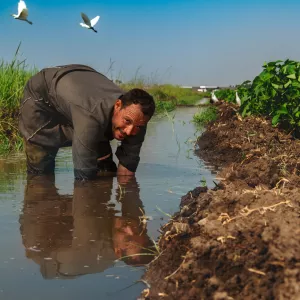Barren Drylands Brought Back into Production through the Enhancing Agricultural Productivity Project
With support from the Government of Japan, and in partnership with the Food and Agriculture Organization of the United Nations (FAO) and Egypt’s Ministry of Water Resources and Irrigation (MWRI), ICARDA has set a new standard for sustainable agriculture in water-scarce regions with completion of the Enhancing Agricultural Productivity project in Egypt, leaving a blueprint for further advancements through technological

Barren Drylands Brought Back into Production through the Enhancing Agricultural Productivity Project
With support from the Government of Japan, and in partnership with the Food and Agriculture Organization of the United Nations (FAO) and Egypt’s Ministry of Water Resources and Irrigation (MWRI), ICARDA has set a new standard for sustainable agriculture in water-scarce regions with completion of the Enhancing Agricultural Productivity project in Egypt, leaving a blueprint for further advancements through technological innovation combined with community engagement.
For decades, Egyptian farmers have faced significant challenges, including rising energy costs, inefficient irrigation systems, and degraded soils caused by salinity and poor drainage. These problems, further intensified by climate change, have led to limited crop yields, narrowed profit margins, and posed a direct threat to the country’s food security.
“The land was highly saline, and the fertilizer would rot; the soil couldn’t absorb it due to the high salinity, so it would simply decay on the surface. I didn’t even bother checking on the land anymore. I was fed up with it.” – Reda Ezzat Hassan El Deen, Farmer, Kafr El-Sheikh, Egypt
From March 2024 to March 2025, the Enhancing Agricultural Productivity project rolled out a package of efficient, climate-smart farming practices across El-Minya, Qena, and Kafr El-Sheikh governorates in Egypt, each designed to address the pressing challenges of water scarcity, high energy costs, and declining soil fertility.
“ICARDA is working to ensure that every drop of water is used efficiently in dryland farming, particularly in Egypt. Through the Enhancing Agricultural Productivity project, we introduced a range of low-cost, science-driven solutions to tackle long-standing challenges such as soil salinity, inefficient irrigation, and rising input costs. Together, these innovations are transforming previously unproductive land into thriving farms.” – Dr. Mohie Omar, ICARDA’s Interim Country Coordinator for Egypt and Research Associate – Irrigation and Water.

